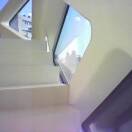 |
| High-tech beehive: Prada Showroom in Aoyama (Japan, 2004) |
Vegetarians visiting Japan often complain about their problems finding suitable food in the country. John Howley maintains a list of Japanese vegetarian restaurants on his website, mentioning only 20 establishments for the Greater Tokyo area -- a conurbation of 20 million people. So, that it is roughly one vegetarian restaurant for every million people (of course, there must be many which have flown under Howley's radar, but still, you get the drift!) Japan is not a vegetarian Utopia by any means, and this fact might seem surprising given its Buddhist past and all, the veneration shown to non-animate entities such as rivers and stones. People don't go heavy on the beef like they do in Australia or the States, but there is usually a certain amount of meat mixed into every meal in Japan -- even tofu gets doused in shaved fish! For vegetarians like my Akiko, trying to educate the masses, all this meat can make life a misery. However, there are vegetarian restaurants around, and if you are in Tokyo, I would recommend a visit to the Hanada Rosso. As well as a delicious range of main courses, the menu features organic beer and wine, soy shakes and organic coffee. The restaurant is located on the second floor of the Sleeve Building, 6-11-1 South Aoyama. The telephone number is (03) 3406 1264.


Having enjoyed a memorable hour or two at Hanada Rosso, playing some personality quiz games I have lately employed for nampa, it was time to hit the streets, and look at the surrounding attractions. We walked into the nearby Idee interior design shop to admire its ample Scandinavian and European displays. It was there, looking out the window, I caught sight of a particularly weird building in the distance, a building audacious even by Tokyo standards -- a crystalline pentagonal green pyramid which Akiko identified as the new Prada showroom. Although neither of us are brand label junkies (nothing could be further from the truth), we decided to make a beeline to the hive-like Prada showroom, to see what the fuss is all about.
Designed by Jacques Herzog and Pierre de Meuron, the building rises from the street like a kaleidoscope, covered with bulbous, diamond-shaped windows. Once inside, those bulbous windows start to distort your senses, making the showroom seem both very big and very small, both at the same time! In fact, "kaleidoscopic" is the best way to describe this building, which is more a piece of art than just a mere showroom. Things always seem to shapeshift when you are inside it. While the outside is green crystal, the interior is a kind of stark white/pearl color which is both soft (in the carpet sense) and futuristic, reminiscent of a UFO. TV sets dangle on stalks from the ceiling, like anemone hunting for prey. Stairs lead to deep-set lounge recesses, where windows afford views of local landmarks, such as Roppongi Hills. It is all very cool, and I couldn't resist snapping off some photos on my keitai phone, even though I was reprimanded for it.



We ended the afternoon at a cafe where Akiko showed me her iPod, a device I had never seen up close before. Scrolling through her Beatles collection over a Cafe Mocha, I had to confess her contraption made my own Sony MP3 player look a little bit silly, a little redundant. Such a shiny toy her iPod was, high-tech, but also organic... in many ways it was just like the organic high-tech Prada Showroom we had just explored, or a polished stone in a shrine that had miraculously come to life, and revealed its spirit to the world! Like the Tempe-Burger I had consumed earlier in the day, just like that Shizandra smart drug, this gadget seemed designed to lift your consciousness into a higher state of being. It wasn't Japanese, but it was still Shinto, and it was still Zen. It was not only Zen, but it was also a vision, and a visitor from the future. A future which, even now, is slowly dragging itself into manifestation, into being. The iPods are merely the vanguards of what is to come. Much as I hate to admit it, the vegetarians are probably much the same. Thus we have been warned. Watch this space for more!




